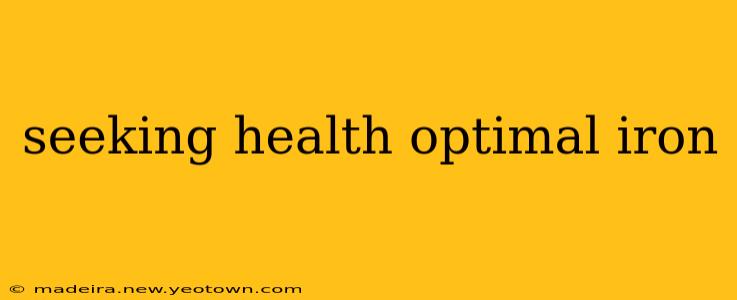Iron. The very word conjures images of blood, energy, and perhaps, the dreaded iron deficiency. But iron isn't just about avoiding anemia; it's a vital nutrient playing a starring role in countless bodily functions. Finding your health-optimal iron level isn't just about avoiding deficiency; it's about achieving a vibrant, energetic life. This isn't a simple matter of popping a supplement; it's a journey of understanding your body's needs, your dietary choices, and the delicate balance that keeps you thriving.
My own journey began with persistent fatigue. I felt perpetually drained, despite getting enough sleep. Blood tests revealed a mild iron deficiency, and that's when my exploration into the world of iron optimization truly began. What I discovered wasn't a simple answer, but a complex interplay of factors. This journey led me to uncover the crucial aspects of iron health, and I’m excited to share them with you.
What are the different types of iron?
Iron exists in two primary forms: heme and non-heme. Heme iron, found in animal products like red meat, poultry, and fish, is more readily absorbed by the body than non-heme iron. Non-heme iron, found in plant-based foods like spinach, lentils, and beans, requires other factors, like vitamin C, to enhance absorption. Understanding this difference is crucial in crafting a diet that effectively supports optimal iron levels.
How much iron do I need daily?
The recommended daily allowance (RDA) for iron varies depending on age, sex, and overall health. Pregnant women, for example, require significantly more iron than adult men. It's essential to consult with a healthcare professional to determine your individual needs. They can order blood tests to assess your ferritin levels – a key indicator of your iron stores – and guide you towards a personalized plan. Relying solely on online calculators or general guidelines is risky, as individual needs vary considerably.
What foods are high in iron?
This is where things get interesting. You don't have to rely solely on red meat! While red meat is a rich source of easily absorbed heme iron, plenty of plant-based options offer substantial non-heme iron. Think lentils, spinach, quinoa, chickpeas, and fortified cereals. Pairing these with vitamin C-rich foods, such as oranges or bell peppers, can significantly boost your body's absorption of non-heme iron.
What are the signs and symptoms of iron deficiency?
Recognizing the symptoms of iron deficiency is crucial for early intervention. These can include fatigue, weakness, pale skin, shortness of breath, headaches, and cold hands and feet. However, subtle symptoms can easily be overlooked, which is why regular blood tests are vital, particularly for individuals at higher risk, such as pregnant women or those with heavy menstrual bleeding.
Can iron supplements cause side effects?
Yes, they can. Consuming excessive iron can lead to gastrointestinal issues like constipation, nausea, and stomach cramps. Iron supplements should only be taken under the guidance of a healthcare professional, who can determine the appropriate dosage and type of supplement for your specific needs. Self-treating can lead to serious health consequences.
How can I improve my iron absorption?
Beyond pairing non-heme iron sources with vitamin C, several strategies can optimize iron absorption. Avoiding consuming iron-rich foods with substances that inhibit absorption, such as tannins in tea or coffee, is important. It’s also wise to avoid taking calcium supplements at the same time as iron supplements because calcium can interfere with iron absorption.
Is it possible to have too much iron?
Absolutely. Hemochromatosis is a genetic disorder that causes the body to absorb too much iron, potentially leading to organ damage. Conversely, while less common, iron overload can occur from excessive supplementation or frequent blood transfusions. This underscores the critical importance of working with a healthcare professional to manage your iron levels effectively.
My journey to health-optimal iron has been one of education and partnership with my doctor. It's a journey that requires ongoing attention and personalized care. It’s not a quick fix, but rather a commitment to understanding your body's needs and making informed choices to support your overall well-being. Remember, always consult with a healthcare professional before making any significant changes to your diet or supplement regimen. Your health is worth the investment.

